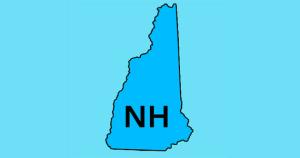New Hampshire Insurance Dept. practically begs carriers to reduce rate filings

A few weeks ago I posted my analysis of the preliminary 2026 individual & small group market filings for New Hampshire, concluding that the state is looking at average rate hikes of around 22.4% for the indy market and perhaps 13% for small group plans.
For the individual market, this is actually slightly lower than the national average (23.4%), and New Hampshire will still end up with the 2nd-lowest avg. premiums in the country (Idaho should be slightly lower next year), but 22.4% is still pretty steep, and the state insurance dept. isn't happy about it:
New Hampshire Insurance Department Urges Health Carriers to Submit Revised 2026 Premium Rates Reflecting Current Economic Conditions
CONCORD, NH (August 11, 2025) – The New Hampshire Insurance Department (NHID) has issued a letter to carriers participating in the state’s individual health insurance market, urging them to review and revise their 2026 premium rate filings in light of emerging policy and economic developments since initial submissions were made in June.
“The continued affordability of New Hampshire’s individual market is not accidental—it is the result of disciplined rate review, competitive market dynamics, and a strong regulatory framework,” said Insurance Commissioner DJ Bettencourt. “While our state has the lowest rates in the nation, we recognize that doesn’t make coverage affordable for every individual or family, and we know there is more work to do. Now, with multiple uncertainties surfacing after the original rate submissions, it is essential that final rates reflect the latest data and not outdated assumptions. This approach ensures Granite Staters remain protected from unnecessary cost increases.”
The Department cited several developments warranting revised filings, including the likely expiration of enhanced advanced premium tax credits (eAPTCs), the continued absence of federal cost-sharing reduction (CSR) reimbursements, and the legislative status of state-level bills with financial implications for the individual market. Additionally, the NHID emphasized the importance of utilizing data-driven pricing methodology, urging carriers to ground their assumptions in credible, current data and to provide transparent justifications for all pricing decisions.
“The NHID remains committed to upholding market affordability while ensuring rates are actuarially sound and based on the actual experience in New Hampshire,” said Deputy Insurance Commissioner Keith Nyhan. “Granite Staters deserve premiums that reflect their local market, not trends imported from other states.”
Carriers intending to submit revised rates must coordinate with the NHID’s Life and Health Actuary prior to the final submission deadline to CMS on August 13. The Department has made clear that revisions should incorporate the latest insights into utilization trends, morbidity impacts, and the effects of expiring federal subsidies, among other factors.
The final deadline was 2 weeks ago, so presumably whatever changes were or weren't made have been locked in by now (NH DOI still hasn't published the final 2026 rates as of this writing).
Regarding the "state-level bills with financial implications" for the individual market, the letter itself indicates these bills:
- SB 17 – Tabled($20.5–$29.0M)
- SB 128 – Tabled ($2.3–$3.475M)
- SB 132 – Tabled ($4–$12M)
- SB 120 – Tabled ($672,840–$2.3M)
- HB 524 – Retained ($7.19M)
- SB 245 – Enacted ($15–$24M)
SB 245 is the only one of these which has actually been passed and signed into law so far; it apparently prohibits surprise ambulance billing and regulates ground ambulance reimbursement, which sounds like a good thing.
As for the other five (four of which were tabled, one of which is "retained" whatever that means):
...requires an insurer to apply an amount paid by a third party, including an independent charity, to the enrollee's cost sharing requirements, except in the case of a covered prescription drug for which there is a generic alternative or interchangeable biological product.
...relates to insurance coverage for biomarker testing.
...relates to children's mental health services for persons 18 years of age and younger.
...relates to health insurance coverage for prosthetics.
HB 524: ("retained") would...
...repeal the New Hampshire vaccine association.
Namely...
New Hampshire has a universal vaccine purchasing program in which the state uses a federal, contracted price list to purchases vaccines at the lowest rate possible for all children, regardless of insurance coverage or income. The New Hampshire Vaccine Association was created by statute (RSA 126-Q) to assess assessable entities for the cost of vaccines provided to insured children under 19 years of age in New Hampshire. NHVA does not set vaccine policy or create vaccine laws. Vaccines for publicly insured, underinsured, and uninsured children are paid for with either the federally funded Vaccines for Children (VFC) program dollars and New Hampshire state funds.
The funds raised by the New Hampshire Vaccine Association are used by the State of New Hampshire’s Department of Health and Human Service’s Immunization Program. New Hampshire’s program equitably shares the cost of the program via public and private resources that pay for the vaccines while providing healthcare cost savings and lowering administrative burden on providers.
Welp. I guess it's a good thing that HB 524 hasn't been passed & enacted yet, although it did pass the state assembly, largely along party lines. Lovely.
As an aside, it's interesting to hear NH Insurance Commissioner DJ Bettencourt complain about the enhanced subsidies expiring and the absence of CSR reimbursement given that he's a former long-time Republican state legislator who was even the state House majority leader who was also President of the Federalist Society at UNH Law.
How to support my healthcare wonkery:
1. Donate via ActBlue or PayPal
2. Subscribe via Substack.
3. Subscribe via Patreon.



